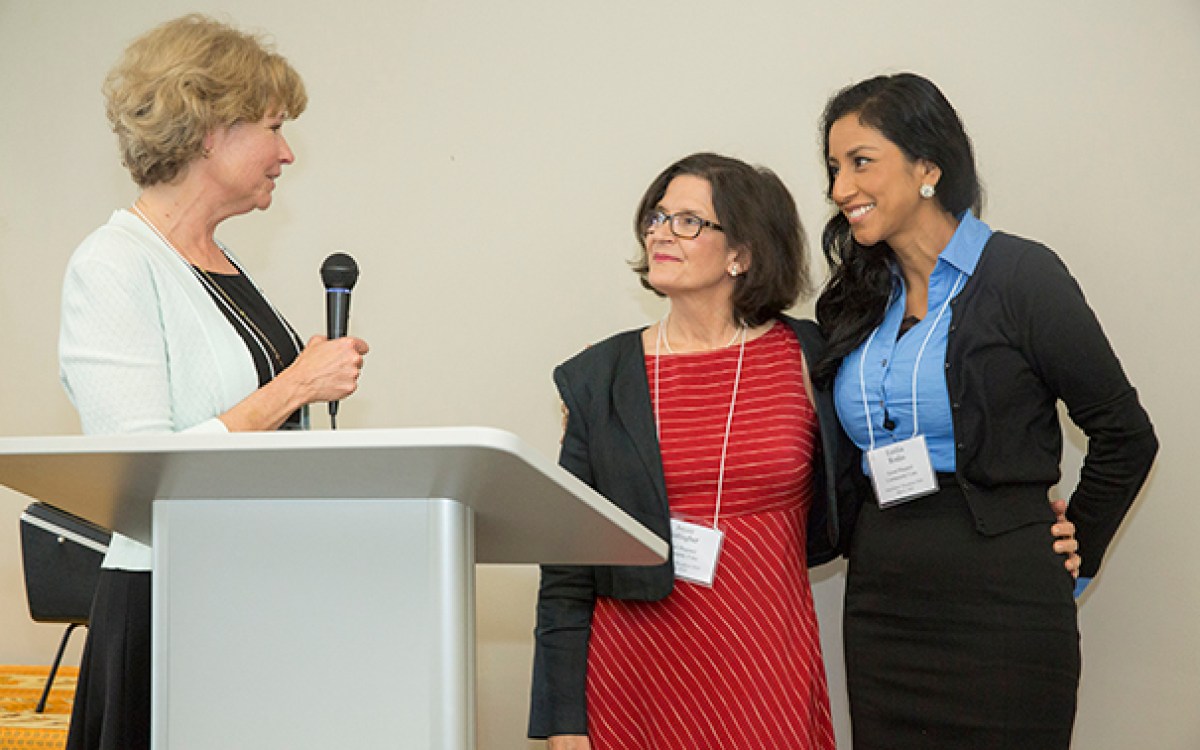From one dreamer to another
Bridge Program gave campus leaders an early boost
More like this
She hailed from Venezuela. He came from Ecuador. She found a job as a cashier at Harvard Business School’s cafeteria because she spoke English. He didn’t know the language and got a position as a custodian at the Harvard John A. Paulson School of Engineering and Applied Sciences (SEAS). Along the way, their paths crossed, and they recognized each other’s fears, dreams, and ambitions. But mostly they bonded over their eagerness to make the most of their potential.
And so they did.
Over 15 years, Monica Tesoriero built on her start in the cafeteria to become manager of overseas financial operations and the faculty grants program at the David Rockefeller Center for Latin American Studies (DRCLAS). A few weeks ago, she was hired as the new director of administration for the Edmond J. Safra Center for Ethics, where she will supervise five employees and manage the center’s budget.
Kalan Chang cleaned classrooms, bathrooms, and offices at SEAS from 2006 to 2010, when he joined the Rockefeller Center as an office and events assistant. In mid-September, he was promoted to take over Tesoriero’s position.
The passing of the baton from Tesoriero to Chang highlights Harvard’s efforts to offer workers the means to make their way up the socio-economic ladder. But it is also a testament to the workers’ own aspirations, hard work, and grit. Both Tesoriero and Chang relish their rise from humble beginnings as they look forward to the next challenge.
“I have always been a dreamer,” said Tesoriero, who came to the United States in 2000 looking for a better future for herself and her 8-year-old son. “When I first came to the United States, I was a single mom, I had zero money, but I dreamed of being independent, owning a house, getting an education, and achieving the American dream. I always knew I wanted something better.”
So did Chang, who was 18 when he started at SEAS, a year after arriving in the United States from his native Ecuador, where his family struggled to make ends meet. From his new office in a modern-looking building of rounded glass and terracotta on Cambridge Street, Chang administers the financial operations of three offices and four programs overseas. On his way to work, he often walks by the building he used to clean, and realizes how far he has come.
“I was scared because I didn’t speak English or have any work experience,” said Chang, whose father immigrated to Ecuador from China in the mid-1950s, escaping from the Cultural Revolution. “But I wanted to learn English, go to college, and I was willing to work hard to achieve my goals.”
While Tesoriero and Chang take pride in their achievements, they also credit the Harvard Bridge Program, which offers English as a second language (ESL) and general educational development (GED) classes, computer training, office internships, and citizenship preparation to workers who want to advance their careers. They both took advantage of mentoring, career development, and internships that gave them office experience.
Tesoriero finished her GED, took computer classes, and did a data-entry internship with the Office of the Assistant to the President, which helped her apply for an office job at DRCLAS a decade ago. She earned a bachelor’s of liberal arts, with a concentration in social sciences, through Harvard Extension School, graduating cum laude.
Helped by ESL lessons and computer training, Chang earned a bachelor’s in government, with minors in accounting and Spanish, also through the Extension School. Chang obtained his U.S. citizenship through the Bridge Program.
Carol Kolenik, the founder and director of the 17-year-old program, takes success stories to heart. Open to all University workers, the program benefits around 500 entry-level employees, from custodians to parking attendants to postdoctoral fellows.
“The program believes that everybody deserves a chance, that the College is not only about faculty and students,” said Kolenik. “It’s also about the staff, people who wear uniforms and name tags, who are so hardworking, dedicated, and committed to improve their lives. We give them training, mentoring, and connections, and they do the rest.”
Chang said he owes a debt of gratitude to Tesoriero, who mentored him since his arrival at the Rockefeller Center. “She was always behind the scenes, encouraging me to take more responsibilities,” he said.
Tesoriero said gratitude for the Bridge Program compelled her to give back. “They were always there, celebrating my victories, pushing me to do more and better,” she said. “They’re like family.”
Tesoriero, who will pursue a master’s degree in leadership and administration at Boston College next spring, said she’d like to mentor people to help them improve their lives and ensure they have access to educational opportunities.
“I didn’t want to be a cashier for the rest of my life,” she said. “Looking back at where I came from, mine has been an unlikely journey, but it was possible because I’ve worked hard but also because I found mentors who believed in me.”
Chang couldn’t agree more. “I was very lucky,” he said. “I found so much support. It has been a long journey but I still have a long way to go.”





